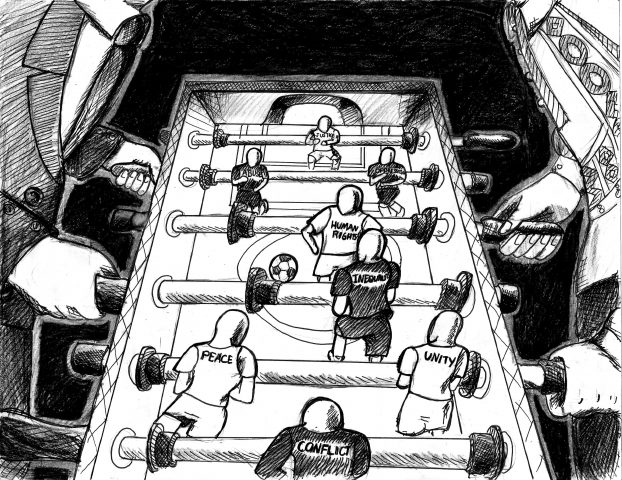Wesley So used to carry the Philippine flag on his shoulders. After bagging the country’s first ever gold in the 2013 World Universiade Games, he was denied a P1-million incentive by the Philippine Sports Commission. So moved to the United States Chess Federation the following year. On November 3 five years later, he became the inaugural World Fischer Random Chess Champion, playing under the American flag.
Inside the arena, athletes and audiences proclaim the spirit of sportsmanship—fairness, respect, and fellowship. But beyond the glitz and glamor of the playing fields, a brewing struggle threatens to boil over, as class, ethnicity, and ideology clash in the background. Time and again, sports achievements have been exploited to save face, diverting from issues like social inequality, abuse, and poor governance.
The victories of Hidilyn Diaz, Nesthy Petecio, Carlos Yulo, and several other athletes exhibited the ability of Filipinos on the world stage. But athletes can easily become unwitting political pawns; posing with President Rodrigo Duterte, Yulo held up a clenched fist. Diaz earlier this year was implicated in the “Oust Duterte” matrix. They are not the first to be subjected to political pressure.
However, foreign sports leagues are not exempt from the pervasive reach of social issues. Just last October 19, Houston Astros assistant general manager Brandon Taubman shouted at female reporters after the baseball team had clinched a spot in the World Series; with expletives, Taubman expressed elation at acquiring pitcher Roberto Osuna, an alleged domestic violence offender. The Astros initially accused the journalists of fabricating the story, and only fired Taubman several days later.
And last October 4, as pro-democracy demonstrations raged in Hong Kong, Houston Rockets general manager Daryl Morey posted a now-deleted tweet, saying, “Fight for Freedom. Stand with Hong Kong.” Team owner Tilman Fertitta went into damage control, disavowing Morey’s stand and declaring that the Rockets were not a “political organization”. But within two days, the Chinese Basketball Association (CBA) suspended ties with the Rockets. The National Basketball Association (NBA) kowtowed, choosing to isolate the incident.
Football is similarly shrouded with socio-political tensions, such as the growing involvement of Arab nations in the sport that has conquered Europe. Posing the question of identity, several Arab-descended individuals glitter the French national team, including Moroccan Larbi Benbarek, Senegalese Patrick Vieria, and Algerians Zinedine Zidane and Karim Benzema. Their roots all lie in former French colonies. Additionally, persisting racism has tainted what might otherwise be branded as multicultural diversity.
There is also the aspect of affluence—English Premier League club Manchester City and French Ligue 1 club Paris Saint-Germain enjoy immense spending capacities, backed by supporters from Abu Dhabi and Qatar, respectively. Their owners, by association with the pinnacle of top-flight football, are allotted a sense of global prestige.
The allure of wealth has made it easy to turn a blind eye on exploitation: controversy surrounds the Fédération Internationale de Football Association (FIFA) stadiums, built through slave labor in the desert heat of Qatar. Yet this has been overshadowed by the grandeur of hosting the 2022 FIFA World Cup, made possible by Qatari bidding efforts.
Past World Cups have similarly offered their glorious stature as something the citizenry could rally behind and pay attention to amid rising social unrest.
History provides more stark reminders of how grim the intersection of sports and political realities can be: when Berlin was selected to host the 1936 Olympics, Adolf Hitler made it a showpiece for his resurgent Germany. In three years, the world was engulfed in war. Then, the 1972 Munich Olympics were marred by the massacre of 11 Israeli Olympians, highlighting the volatility of the Palestinian-Israeli conflict. In Moscow, 1980, the first Olympics held in Eastern Europe saw the mass boycott of 66 countries—the largest in the competition’s history—following the Soviet Union’s invasion of Afghanistan.
But there have also been bright spots.
During the 2018 Winter Olympics opening ceremony, North and South Korea marched together under the Korea Unification Flag even though the women’s hockey team was the only one unified.
At a preseason NBA game after the Rockets-CBA fiasco, audience members echoed Morey’s statement through shirts and signs—a stand of solidarity.
Meanwhile, off the back of successful displays in the the 2019 FIFA Women’s World Cup, women football stars from countries like Brazil, Germany, and the United States have used their platforms to protest inequality and call out perpetuators of discrimination. Earlier this month, Australia was the first to guarantee their women’s national football team equal commercial revenue as their male counterparts.
With the Southeast Asian Games to be hosted in the Philippines later this month and the 2020 Tokyo Olympics set for next year, nations will again be pitted against each other, but this time it may do us well to reassess what it means to represent a flag and country, and to be cognizant of the underlying pressures and tensions that permeate things we negligently only view as entertainment.
Frequently intersecting with socio-political realities, sports do not exist in a vacuum. Rather than permit the status quo to persist by being apolitical or ignorant, we must instead acknowledge such forces, contemplating how power struggles within society and dynamics that transcend state borders advance various agendas and ideologies.
The values of sportsmanship that we hold as ideal can no longer be kept isolated within an arena. Instead, those values must be taken outside of the stadium for international sports to serve as a unifier of people rather than a self-serving tool for division.

